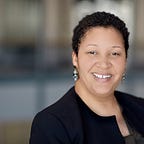People aren’t “rioting.” They’re communicating in the language of capitalism.
George Floyd was murdered after being falsely accused of using a counterfeit $20 bill. In response unarmed community members have taken to the street in protest of Floyd’s death and take a stand to remind people that Black lives matter. In the wake of these protests, many cities have seen property damage and “looting.”
The accusation of passing a counterfeit bill is significant. Having previously worked in retail, including assets protection, for almost 6 years prior to law school, I have seen first-hand how racism intersects with perceptions of poverty in these accusations. It is also one of the few financial crimes subject to real-time police response, often in response to businesses attempting to protect their financial interests at the expense of poor people and Black people, who have long been profiled for “shopping while Black.”
Police were on sight to defend the interests of capitalism. It is the ability of private business to protect their interests through arms of the state that continues to funnel Black people into the web of the criminal justice system, and it is this contact with police that is hazardous to Black life and health. And Floyd lost his life being wrongly accused of a crime that carries a sentence of no more than 5 years by an entity with a financial stake in police enforcement.
Like previous characterizations of Ferguson and Baltimore, news outlets across the country have described these latest uprisings as riots. But let’s be clear, people are not rioting, they are communicating in the language of capitalism.
In expressing discontent about systemic state violence against Black people, white people, including many white liberals, espouse the nonviolent values of Martin Luther King, Jr. and expect Black people to speak politely, follow the rules of respectability when engaging in civil disobedience, and trust the system to fix itself. But, Black people in Minneapolis — and elsewhere — know that this is a false bargain. Bystanders followed the rules, did not physically intervene, and the officer still murdered Floyd.
“I can’t breathe.” These were the final words of George Floyd begging for his life. Witnesses begged for officers to exhibit anything other than malicious indifference, also to no effect. And so they watched as the officer kneeled on Floyd’s neck for almost nine minutes as his breath escaped his body.
And we’ve seen this before. Eric Garner’s pleas that he could not breathe went unheeded almost six years ago.
So I ask you, what is the proper response by community members across the country when traditional pathways have not worked?
Over 50 years ago MLK let us know that, “rioting is the language of the unheard.” By the time he was assassinated he realized that significant disruptions to the capitalist systems were the only way to be heard. In 2020, a “riot” is communicating the oppression and racial terror that characterizes the everyday experience of being Black in America in a way that the powers that be understand: through private financial interests.
The language of capitalism is also reflected in protesters’ demands in this moment directly take aim at the nexus between capitalism and state violence. No longer are the asks centered on reforms that would allow police to carry on business as usual, like showing up in force to protect a sports venue and violently suppressing protesters’ constitutional rights, plow patrol cars into crowds of protesters, and shoot and arrest reporters. Divestment from police and investment into community-led alternatives is the only way to a future where Black lives matter.
To reach a place where America actually values Black lives, we need to decrease the power and shrink the footprint of police. We must redefine public safety as it exists outside of the goals of protecting capitalist, white supremacist interests. In the world we’re building, public health means guarantees of housing, health care, and education and the ability to exist while Black, and live to see the future.
And so, no, America is not “rioting.” People are calling attention to structural racism and systemic violence — and demanding divestment from oppressive structures — in a way that the rest of America can clearly hear and understand. It is up to us to listen.
